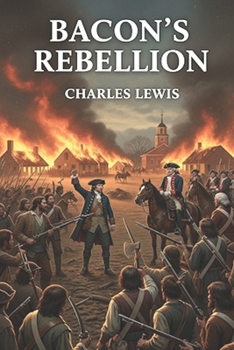Bacon's Rebellion: Shaping American History
Discover the bloody, fiery prologue to the American Revolution that history books often overlook.
One hundred years before the Declaration of Independence, a different kind of revolution set Virginia ablaze. It wasn't led by Founding Fathers in powdered wigs, but by a charismatic rebel named Nathaniel Bacon and a ragtag army of indentured servants, frontiersmen, and enslaved Africans.
In "Bacon's Rebellion: Shaping American History," author Charles Lewis unearths the gritty, turbulent reality of colonial America-a world far removed from the sanitized narratives of pilgrims and progress. This is the story of the first time American colonists took up arms against a corrupt royal governor, burned their own capital to the ground, and forced the British Crown to tremble.
Why You Need to Read This Book:
The Hidden Origins of Race & Class: Discover how a terrified ruling elite responded to a unified uprising of black and white laborers by inventing the "divide and conquer" strategy-a decision that birthed the racial caste system and chattel slavery, forever altering the DNA of the United States.
A Mirror to Modern Politics: Explore the eerie parallels between 1676 and today-a populace feeling abandoned by a distant elite, the tension between frontier security and diplomatic nuance, and the explosive power of populist rage.
Action & Intrigue: From the suspense of the "Starving Time" to the scorched-earth tactics of the "Indian Burning" and the dramatic inferno of Jamestown, this narrative moves with the pace of a thriller while maintaining the rigor of history.
The Second Edition: Vastly Improved & ExpandedWe listened to our readers, and this Second Edition has been meticulously revised to offer the definitive account of this pivotal conflict.
Refined Narrative Flow: Experience a seamless, chronologically tightly-wound story. All redundancies have been eliminated to ensure a gripping, page-turning experience from the first spark of discontent to the final act of the King's justice.
Enhanced Historical Analysis: Deeper dives into the "Morgan Thesis," providing a clearer window into how the rebellion catalyzed the transition from indentured servitude to racial slavery.
Comprehensive New Resources: Now features an expanded, alphabetized Glossary of key colonial terms and a professionally curated Bibliography of 50 essential primary and secondary sources-perfect for students, genealogists, and history buffs who want to dig deeper.
"Bacon's Rebellion" isn't just history; it is the blueprint of the American experience.
Get your copy of the Second Edition today and witness the spark that eventually ignited a nation.
Related Subjects
History




